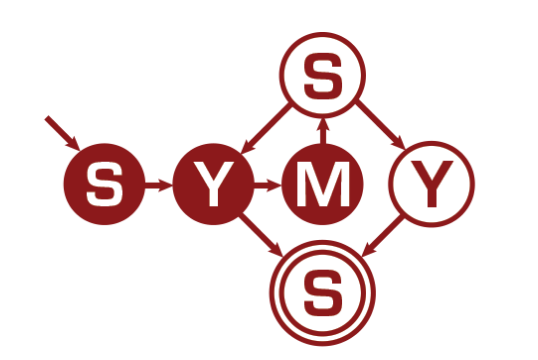"What ethical issues arise when developing intelligent/autonomous systems, and how should we address them? How can we build technologies which promote human autonomy, justice, and fairness? It is my hope that SymSys will help me build both the ethical/social foundation and technical background necessary to answer them..."
Caroline is a junior majoring in SymSys with an individually-designed concentration in the Ethics of Technology.
Introduce yourself: I'm a junior majoring in SymSys with a concentration in Ethics of Technology. On campus, I serve as the exec lead of Girls Teaching Girls to Code, a co-chair of HackOverflow (WiCS exec board), a peer counselor at the Bridge, and a VR programmer at the Virtual Human Interaction Lab. In my free time, I write a satire blog on tech/CS, go out to social dance events, take long walks around campus, participate in hackathons, and yell about AI ethics. Also, I made a meme about SymSys once.
What drew you to the SymSys major? Why did you pick SymSys as opposed to other (especially, related) majors?
I really love the breadth and flexibility of the SymSys major – as someone with interests in both tech and the humanities/social sciences, I was super excited about the fact that I could learn about areas of which I had no prior knowledge (i.e., psychology, neuroscience, linguistics) while going deeper into my personal areas of interest (i.e., computer science/AI, philosophy). Also, while this wasn't really a reason I chose the major, SymSys is basically the "meta-major": you get to think about the nature of thinking! How cool is that?
What is your concentration and why did you choose it?
When I first came to Stanford, I was deeply interested in political science and ethics, and while my passions may have shifted in a more technical direction, that hasn't changed. As a result, I've developed an individually designed concentration in Ethics of Technology, which will allow me to augment my CS coursework with classes providing a more critical lens on my technical interests. Since I'm currently planning to go into the tech industry, I figure it's my responsibility to ensure the products I build and algorithms I design are beneficial for society.
What’s your favorite SymSys-related class that you’ve taken so far?
I can't say enough good things about CS 103 – it's an incredibly well-taught course which made me fall in love with math again. Plus, you get to learn the mind-blowing philosophical/social/technological implications of the theoretical content you learn along the way. Want to know why you can never build a completely secure voting machine or whether we can prove all truths to be true? To find the answers to these questions (and more!), take CS 103.
Are you involved in research? If so, tell us about a project you are working on:
This year, I started working for the Virtual Human Interaction Lab through the Virtual Reality Intensive Training Seminar (VRITS), which has been a very "SymSys" experience since the lab combines elements of CS and psychology in its research. Currently, I'm programming the environment for a study on how various VR experiences impact people's emotions.
What is one piece of advice you'd like to offer to younger students?
Explore as much as you can, and don't be afraid to dive into subjects you know nothing about! While this definitely relates to SymSys, you should take it more broadly as well – there's so many amazing fields of study at Stanford that probably weren't offered at your high school, so why limit yourself to the ones you're familiar with?
What underlying questions and issues do you hope to tackle/learn more about through SymSys?
As an aspiring AI ethicist and engineer, I'm interested in a couple questions in particular: 1) What ethical issues arise when developing intelligent/autonomous systems, and how should we address them? 2) How can we build technologies which promote human autonomy, justice, and fairness? It is my hope that SymSys will help me build both the ethical/social foundation and technical background necessary to answer them.
Caroline is one of many profiles featuring selected alumni, undergraduates and graduates who are involved in the Symbolic Systems community.





